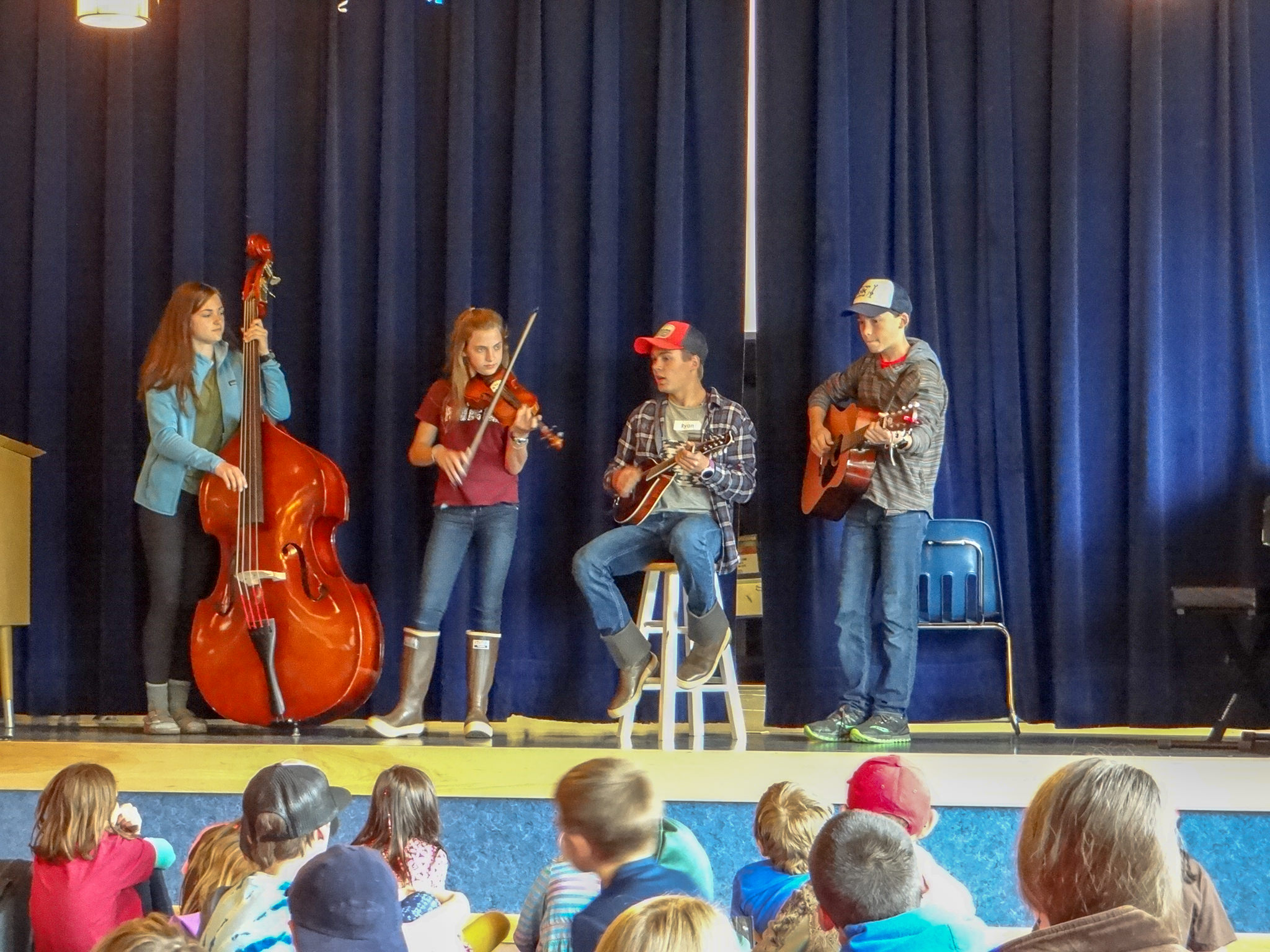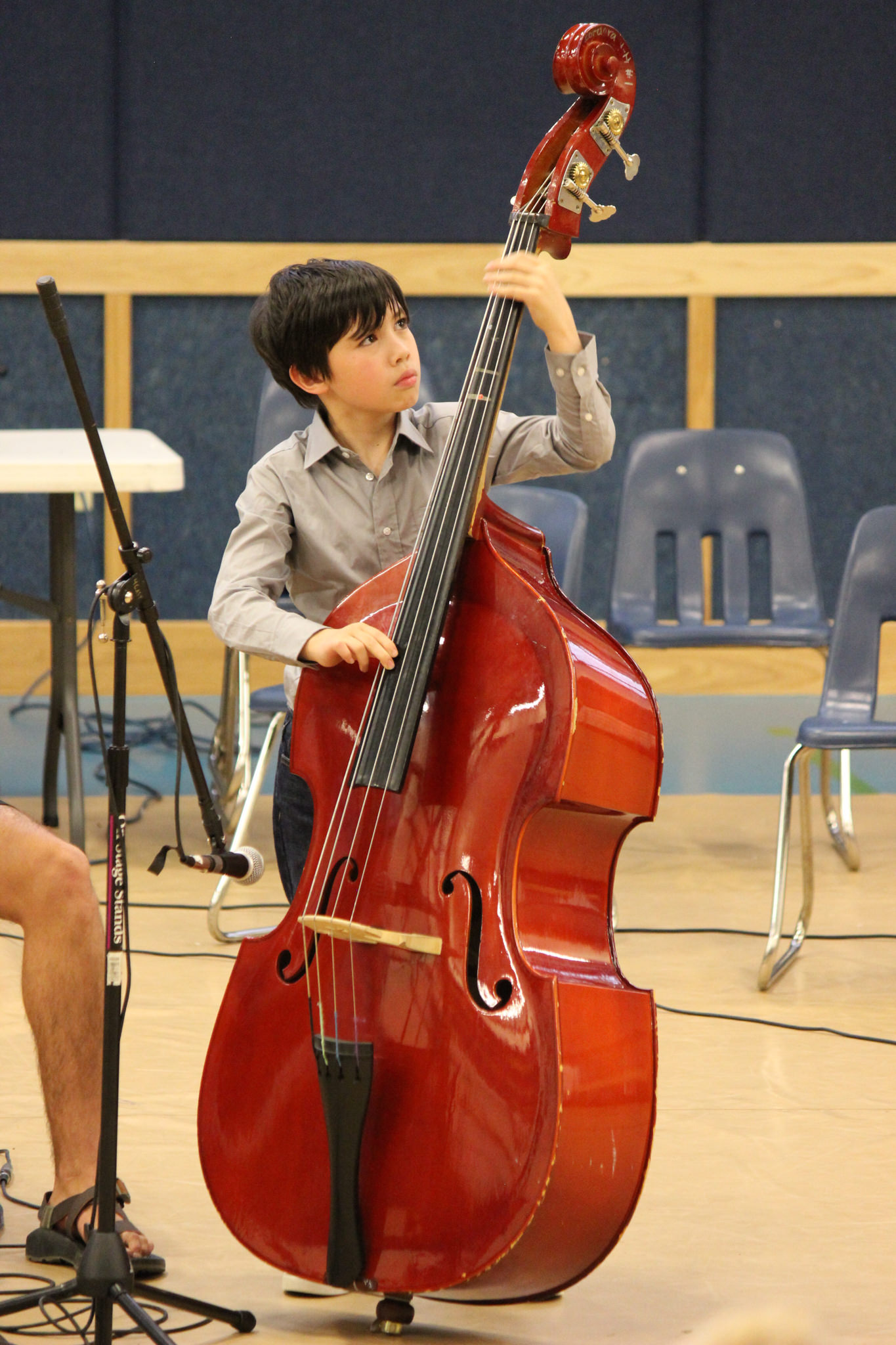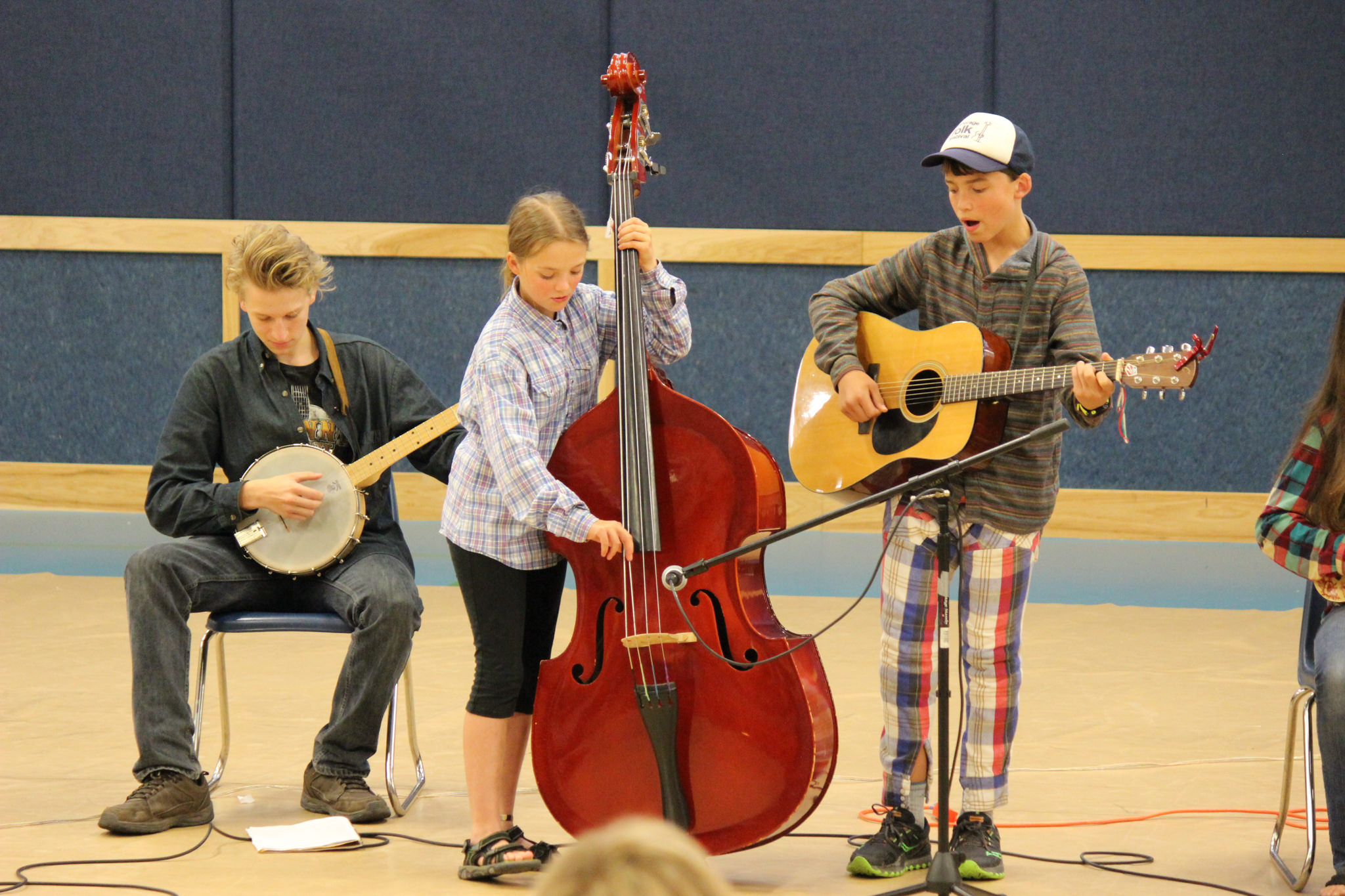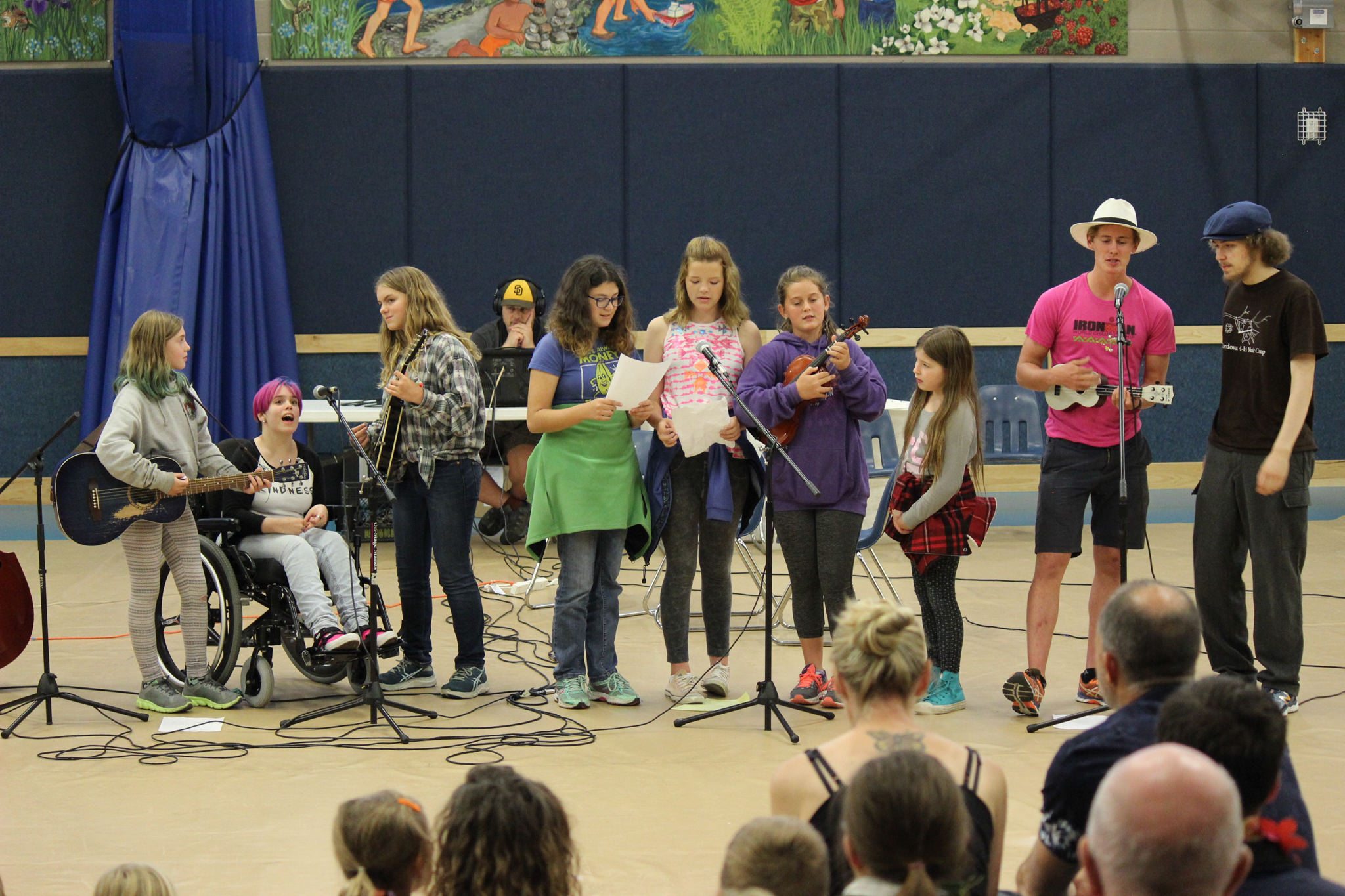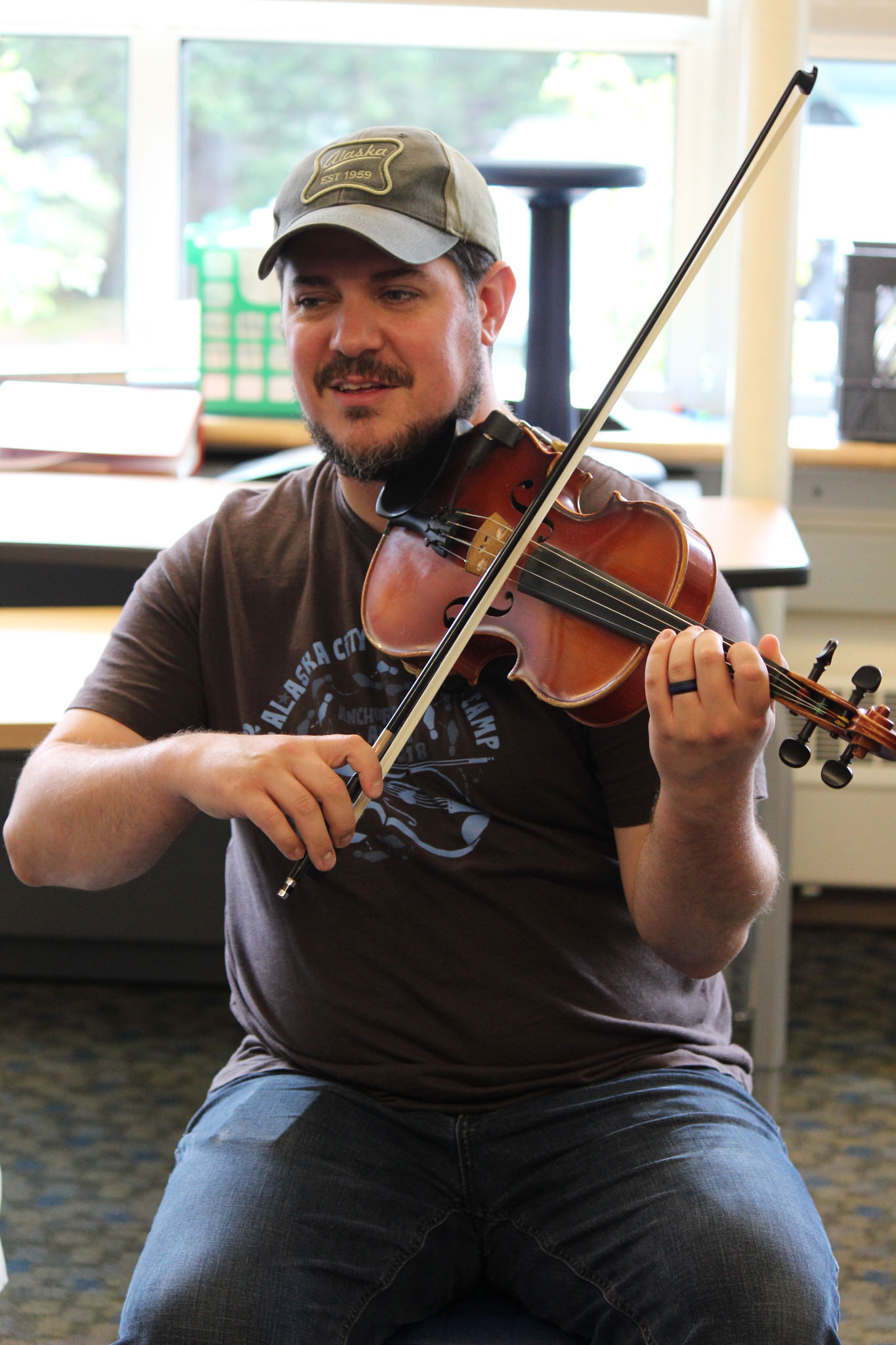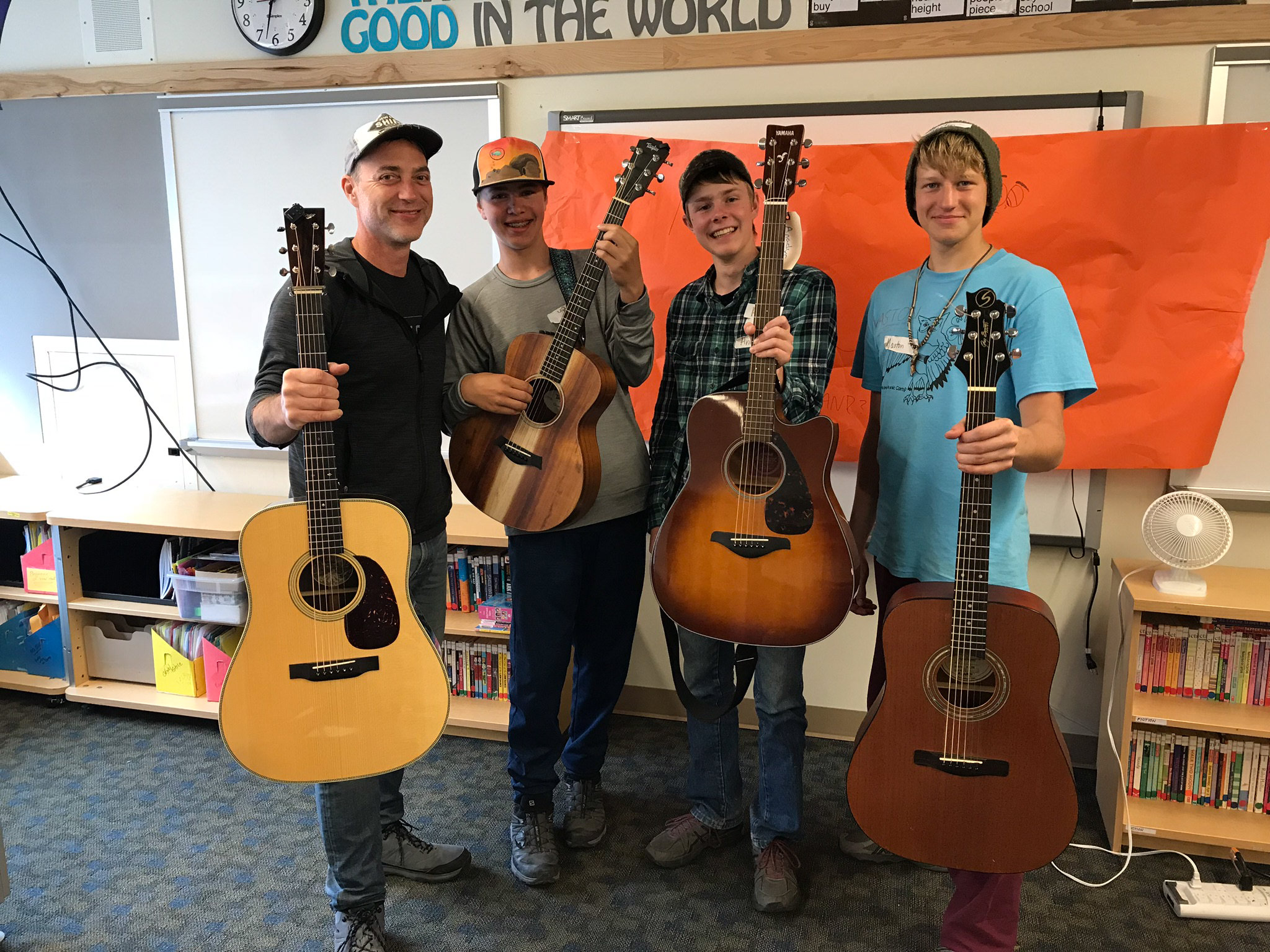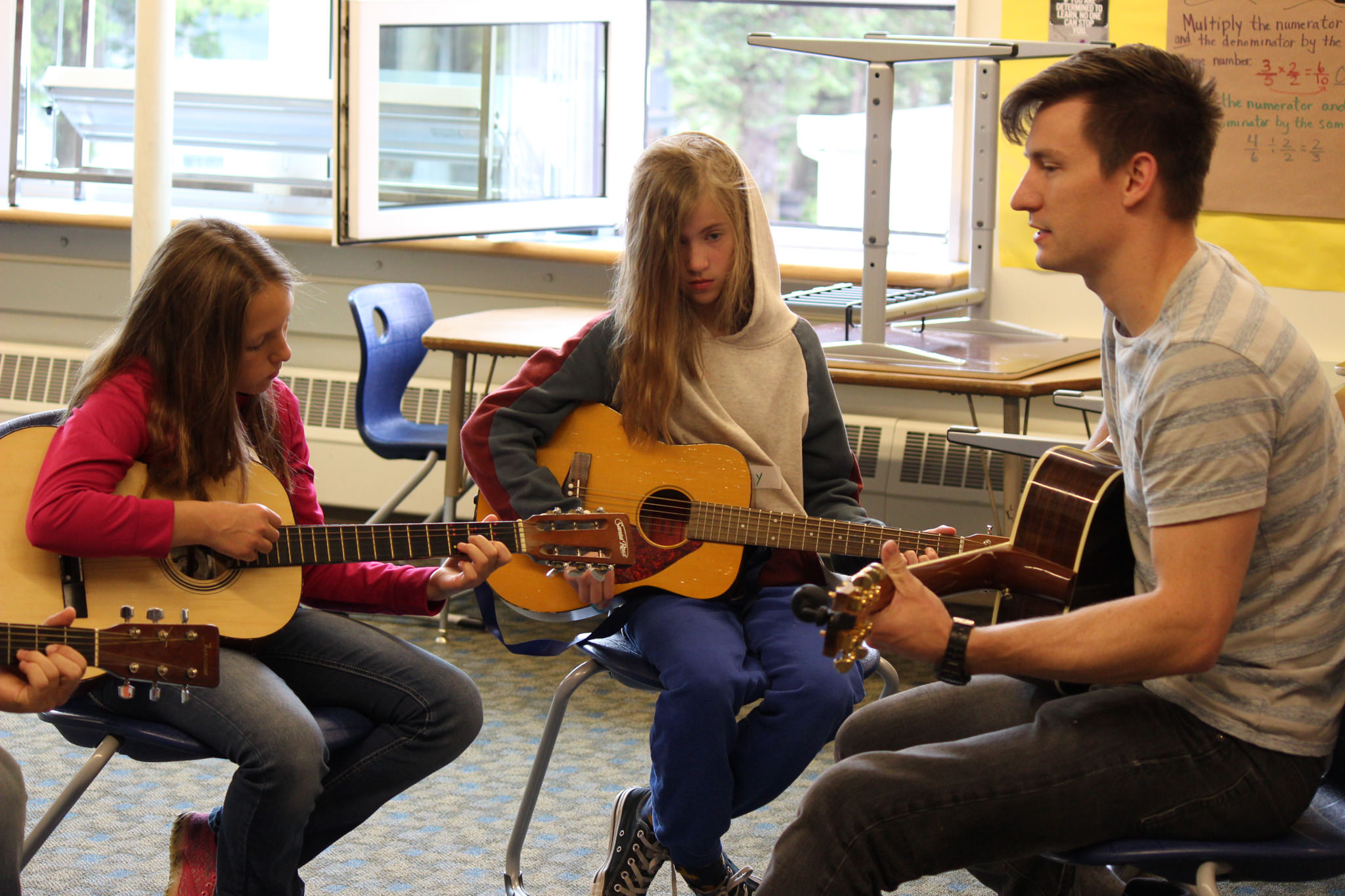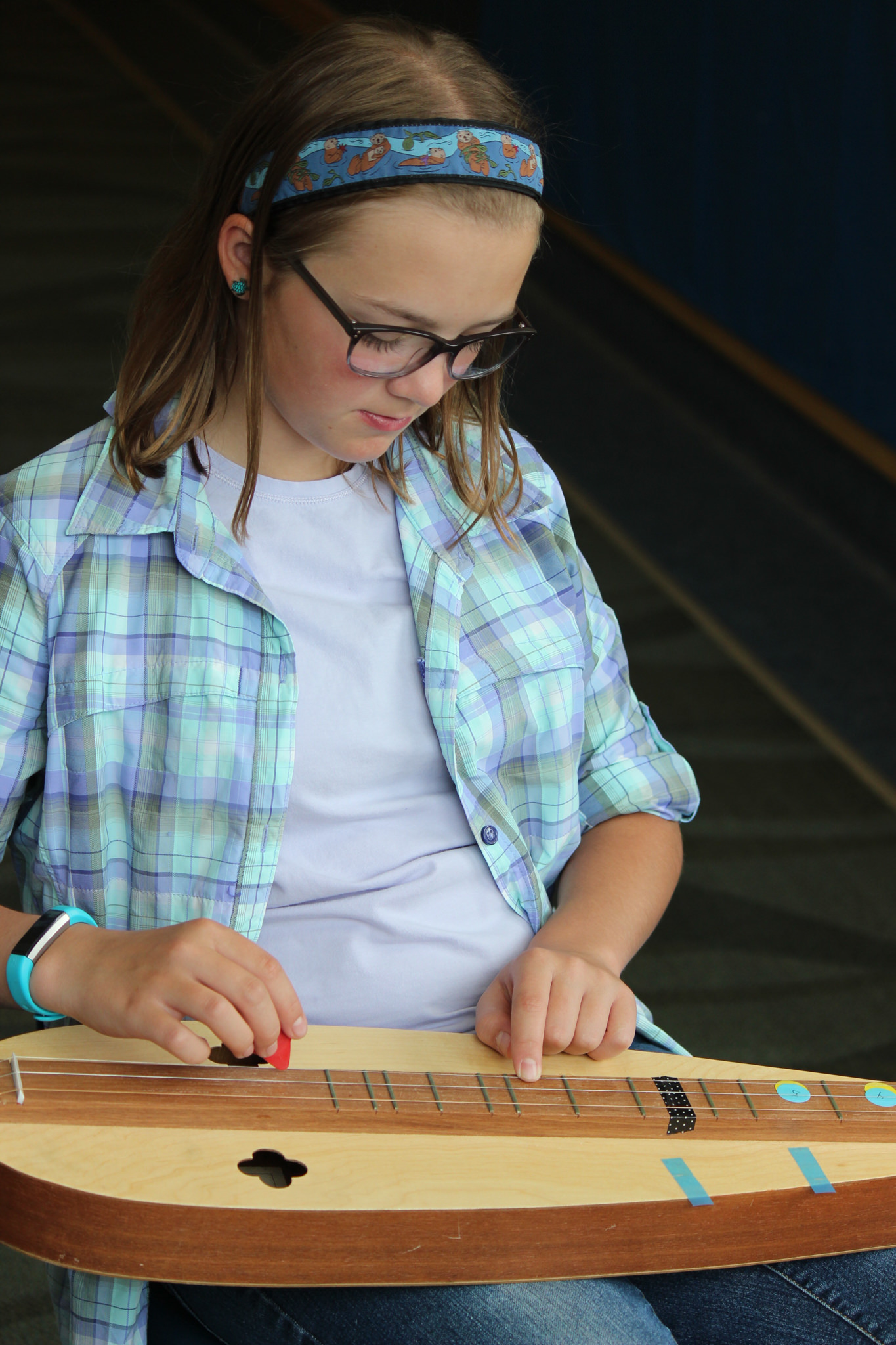Class Electives
Students will be taking a different class during each Block for a total of three classes, plus a band class. Although your student will only be taking three classes, please indicate your top four choices in order of importance on the Registration Form. We will make every effort to give each student his or her top three choices for the three Blocks. If you have questions about what classes to sign up for, please contact us.
Please spend a few moments on your Registration Form to tell us about your ability: How many years you have played, what your favorite song is, what song you are currently working on, other capabilities, and your goals for camp. You may fill this out in the “Final Comments” section.
We highly recommend that students that sign up to be in an Intermediate, Advanced, or Master level class also sign up to be in a Jamming class. One of the great things about being able to play and learn music is to able to play songs with one another and our peers, and our Jamming classes encourage that growth in our more advanced students.
BEGINNING BANJO
No prerequisite. Students must be ten or older due to the length of the banjo. This class is an introduction to the three-finger style of bluegrass banjo playing. Students will learn basic rolls, chords, and an easy banjo tune.
INTERMEDIATE BANJO
Students will begin to improve on rolls and increase their repertoire of rolls and chords used in bluegrass tunes. This class will teach how to read tab as well as teach students 3-4 basic bluegrass tunes on banjo.
ADVANCED BANJO
Students should be comfortable playing at least five chords and rolls on the banjo, as well as most of the basic bluegrass tunes, and also feel comfortable in beginning jam scenarios. Students will learn the nuances of the role of the banjo in bluegrass jams and bands and learn how to solo, as well as increase their song repertoire.
BEGINNING BASS
No prerequisite. Students will learn how a bass fits into a jam or band. They will learn 4-5 chords and how to back up a guitar on some simple singing songs.
INTERMEDIATE BASS
Students should have been taking lessons in orchestra or otherwise for at least 6 months. Students will learn chords to back up a guitar, as well as scales, patterns for following new chords, new songs, and how to “walk” bass lines.
ADVANCED BASS
Students should be comfortable in beginning jam sessions, should be starting to hear chord changes, know all of the major chords, and should be fairly comfortable with their rhythm. Students will learn theory behind the Nashville Number System, how to solo on the bass, different scenarios for moving from chord to chord, and the nuances of how the bass fits into a band or jam.
INTERMEDIATE ELECTRIC BASS
Students should have been taking lessons in orchestra, band, or otherwise for 6 months to a year. Students should be fairly familiar with the notes of the bass and how to play in rhythm. This class is an introduction to how to play electric bass on bluegrass and folk songs. This is similar to the Intermediate Bass class, but will be taught on electric bass instead of acoustic stand-up bass.
ADVANCED ELECTRIC BASS
Students should have been taking lessons in orchestra, band, or otherwise for 2 years. Students should be very familiar with the notes of the bass, how to pluck in different rhythm and genres, chord changes, and at least starting to solo on the bass. This class will cover how to play electric bass on bluegrass and folk songs, for more advanced players. This is similar to the Advanced Bass class, but will be taught on electric bass instead of acoustic stand-up bass.
BEGINNING FIDDLE
No prerequisite. This class is geared towards students who have no or very little background in playing fiddle or violin. Students will learn how to correctly hold and bow the instrument as well as a few basic fiddle tunes.
INTERMEDIATE FIDDLE
Students should have been taking fiddle for one year or be in Suzuki Book 1, and/or know songs like Boil Em Cabbages, Buffalo Gals, Old Joe Clark, Cripple Creek, Angeline the Baker, or Camptown Races. In this class, students will work on becoming stronger players and learn a few basic fiddle tunes in first position.
ADVANCED FIDDLE
Students should be in Suzuki Book 2 and/or be fairly comfortable playing basic fiddle tunes such as Over the Waterfall, Arkansas Traveler, Soldier’s Joy, etc. Students will increase their fiddle tune repertoire, and begin to learn how to put together a solo to singing songs.
MASTER CLASS - FIDDLE
This class is geared towards students who already know most of the basic fiddle tunes, like Blackberry Blossom, Fisherman’s Hornpipe, Wheelhoss, Squirrel Hunter, etc. Students will learn the nuances of bluegrass fiddling, including bowing, tunes, fingerings, improvisation, backup, and other techniques.
TWIN FIDDLE
Students must also be signed up for Intermediate, Advanced or Master Class Fiddle. This class will teach students how to find and play harmony parts on the fiddle. Students will learn the lead and harmony part to a few different fiddle tunes.
BEGINNING GUITAR
No prerequisite. Students will learn 4-5 basic guitar chords, how to strum with a pick, and a few basic bluegrass and folk songs.
INTERMEDIATE GUITAR
This class is geared towards students that can play 4-5 chords comfortably and the boom strum rhythm. Students will begin to flatpick, along with strengthening their chord and rhythm knowledge.
ADVANCED GUITAR
This class is for students who are comfortable with many chord changes: Most of the major chords, and a few minor and seven chords. Students will increase their chord and theory knowledge, as well as work on basic soloing and begin to learn how to improvise.
MASTER CLASS - GUITAR
The Master Class for Guitar is for students who are very comfortable with their rhythm and chord changes and are ready to explore the nuances of how guitar fits into band and jam scenarios. Students will also continue working on creating a great solo and how to improvise.
BEGINNING MANDOLIN
No prerequisite. This class will teach students the basics of how to hold and play the mandolin. They will learn a few easy mandolin chords, some bluegrass tunes, and mandolin rhythm.
INTERMEDIATE MANDOLIN
Students should be quite comfortable playing 2 finger chords. They should also be able to play a few basic tunes like Boil Em Cabbages, Shortenin’ Bread, Old Joe Clark, Cripple Creek, or Angeline the Baker. Students will learn how to play closed finger chords, work on their rhythm, and lead on a few new fiddle/mandolin tunes.
ADVANCED MANDOLIN
Students should be comfortable with three or four finger chords, and should be able to jam on some easy tunes. Students should also be able to play lead on tunes such as Soldier’s Joy, Over the Waterfall, Fisherman’s Hornpipe, Arkansas Traveler, etc. Students will increase their tune repertoire, learn how to jam on some more difficult tunes, and be introduced to the Nashville Number System.
MASTER CLASS - MANDOLIN
Students should be very comfortable with all of the three-or-four-finger major chords, and should know some minor chords, as well being comfortable playing more complicated tunes such as Blackberry Blossom, Opus 23, or Wheelhoss. Students will learn the nuances of how a mandolin fits into a jam or band, how to create a great solo, and how to backup a singer or lead player. Students will also begin to explore improvisation techniques and genres: Dawg, jazz, and blues.
MOUNTAIN DULCIMER
The mountain dulcimer is an American folk instrument which grew out of the southern Appalachian Mountains in the early 1800s. It's easy to learn to play and no prior musical background is needed. Part of what makes it easy is that there are only three strings and fewer frets that a guitar (which means fewer wrong notes!) We will be learning to play fiddle tunes, as were heard in the Appalachians and are still played by Old Time and Bluegrass musicians, plus chords to use in accompanying singing or other instruments. Cardboard instruments will be available for your use if you register before Thursday, instruments so that you can continue to play, they will be available for $50.
PIANO
This class is open to all levels and will explore piano as a folk instrument. Students will learn to build scales and chords to jam along with their favorite songs, and the finger technique to pull it off. They will also learn about chord progressions, melodies and useful accompaniment patterns. Since this is a folk-based piano class music-reading is not a requirement, but we will use some musical notation for reference.
BEGINNING UKULELE
No prerequisite. Students will learn basic chords on the ukulele, how to strum and tune the instrument, and a few songs.
INTERMEDIATE/ADVANCED UKELELE
Students should know basic ukulele chords and be able to follow a chord chart or songbook. Students will increase knowledge about ukulele chord structures and strumming patterns.
JAZZ
This class is for middle and high school students who are proficient in their instruments and are ready to improvise. On two of the class days, they will have instruction by famous visiting jazz musicians who play the bass, piano, trumpet, saxophone and drums.
VOCALS
No prerequisite. Students will learn fun singing songs to sing with a group, a guitar, or by yourself.
TEEN VOCALS
Ages 12 and up. This class is geared for older students, who will work on harmonizing and the finer techniques of singing, while building their repertoire. You don’t need to have any singing experience to take this class.
SONGWRITING
This class is geared for our older and/or more experienced students. Students must at least be at an intermediate level in their instrument, or be 11 years old. This class will learn the art of to how to write songs, from instrumentation to lyrics.
BEGINNING JAMMING
Students must be signed up for an Intermediate class in the instrument of their choice, or be an older student (ages 12 and up). Students must have a basic understanding of their instrument, and be able to play 1-2 tunes like Boil Em Cabbages, Old Joe Clark, Cripple Creek, Shortnin’ Bread, Buffalo Gals, Camptown Races, or similar songs OR be able to play 3-4 chords and rhythm. Students will learn how to jam with their peers by learning basic jamming tunes, the different elements of a jam, and jamming etiquette.
INTERMEDIATE JAMMING
Students must be signed up for an Intermediate or Advanced class in the instrument of their choice, or be an older student (12 and up). Students must have a basic understanding of their instrument and be able to play 4-5 tunes like Soldier’s Joy, Arkansas Traveler, Turkey in the Straw, Over the Waterfall, Liberty, or similar songs OR be able to play the 5 major chords, and 2-3 seven chords and minor chords. Students will continue to increase their jam tune repertoire, and begin to take leads in singing songs.
ADVANCED JAMMING
Students must be signed up for an Advanced or Master class in the instrument of their choice, or be an older student (12 and up). Students will continue to learn how to create a successful jam with their peers - taking leads when appropriate, how to sing verses or choruses, and keeping background rhythms for the group. They will also delve into the different genres of acoustic music, and learn some traditional jamming tunes that are commonly played.
HULA AND TAHITIAN DANCING
Students will learn basic hula dances, taught by master dancer, Alyssa Reyes from the Ke Kukui Foundation in Vancouver, WA.
SOUND
Students will learn how to set up and take down a sound system, basic sound knowledge, how to run a sound board, and participate in Blackboard concerts and dances.
Percussion
Students will learn basic percussive instruments that are found in Bluegrass bands, focusing on rhythm.

